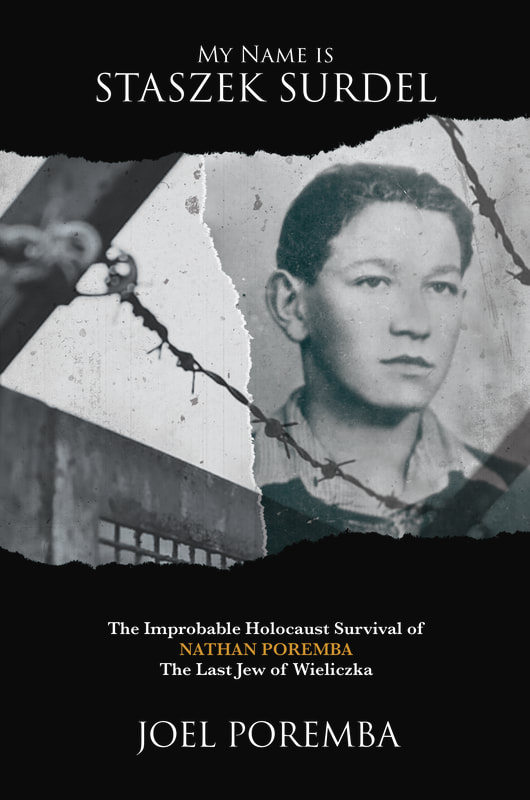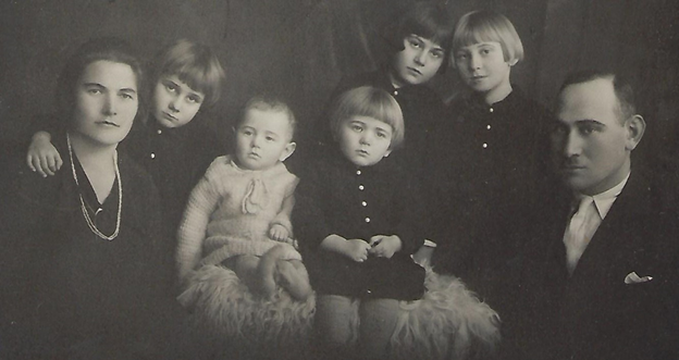|
“I never told the complete story of my survival until 2019 when I shared it with my son, Joel, who was ready to hear it. Why did I hold it for so long? I will tell you. To share this painful part of my life is to reveal a period where I lost my family, was victimized, hunted and left without power over my life. To talk about it exposes me at my lowest. But as I look back today, I realize I did have power and I used it to stay alive. In telling my entire story, I no longer feel a victim's shame and instead know I have made proud my parents, sisters and the Jews of Wieliczka, Poland.”
- Nathan Poremba, April 2019 “For the survivor who chooses to testify, it is clear: his duty is to bear witness for the dead and for the living. He has no right to deprive future generations of a past that belongs to our collective memory. To forget would be not only dangerous but offensive; to forget the dead would be akin to killing them a second time.” - Elie Wiesel, z”l , Night |
The improbable true story of a nine-year-old Polish boy’s Holocaust survival
This memoir traces the Holocaust through the eyes of young Nathan Poremba and examines the difficult emotional and physical choices he made to survive. On September 12, 1939 when he was nine years old, Nathan’s father was murdered by the Nazis in his hometown, Wieliczka, (phonetic "Ve-leech-ka"), located in Southern Poland. On this day, Nathan’s childhood ended and adulthood was thrust upon him.
Nathan’s life then became one of resistance and triumph. He refused to wear the mandated Star of David armband and instead risked his life in order to blend into the local population in order to buy food for his family. He snuck in and out of three ghettos and witnessed brutal Polish complicity in German crimes against Wielickza’s Jews. While rumors of deportation and “re-settlement” circulated throughout Poland, Nathan refused to wait for someone else to determine his fate: he would not sit to see whether his town would be similarly placed under such orders. In 1942, with Wieliczka closed off and travel restricted for Jews, twelve year old Nathan made the heart-wrenching decision to flee home alone and leave the protection of his mother and older sisters.
Nathan obtained false papers bearing the name of a dead Christian Polish boy, "Staszek Surdel" (phonetic "Sta-shek Sur-dell"). He worked incognito as an apprentice in a shoe shop in Krakow and later on a farm in Bibice under the constant pressure to perfectly play the role of an orphaned Christian. Thinking he was safer on the farm than in the city with false papers, Nathan soon discovered he was not so safe because one of his duties was delivering dairy products to German soldiers at a nearby WWI fortress which had been re-populated by German forces.
But, an altercation with a soldier at the nearby German fortress resulted in Nathan being sent to concentration camps at Bergen-Belsen and Płaszów. Nathan’s resolve was repeatedly tested until early 1945 when the Soviet Red Army and Nazis clashed at the fortress and then at the farm he had been hiding in.
Alone and without help for most of the Holocaust, Nathan Poremba’s six-year survival necessitated avoiding detection while maintaining an unflinching will to live despite the threats that enveloped his every move. His unmatched resilience is a testament to his will to live. Throughout, Nathan never acquiesced to antisemitism and he consistently resisted his tormentors as his father had before the Holocaust.
This memoir traces the Holocaust through the eyes of young Nathan Poremba and examines the difficult emotional and physical choices he made to survive. On September 12, 1939 when he was nine years old, Nathan’s father was murdered by the Nazis in his hometown, Wieliczka, (phonetic "Ve-leech-ka"), located in Southern Poland. On this day, Nathan’s childhood ended and adulthood was thrust upon him.
Nathan’s life then became one of resistance and triumph. He refused to wear the mandated Star of David armband and instead risked his life in order to blend into the local population in order to buy food for his family. He snuck in and out of three ghettos and witnessed brutal Polish complicity in German crimes against Wielickza’s Jews. While rumors of deportation and “re-settlement” circulated throughout Poland, Nathan refused to wait for someone else to determine his fate: he would not sit to see whether his town would be similarly placed under such orders. In 1942, with Wieliczka closed off and travel restricted for Jews, twelve year old Nathan made the heart-wrenching decision to flee home alone and leave the protection of his mother and older sisters.
Nathan obtained false papers bearing the name of a dead Christian Polish boy, "Staszek Surdel" (phonetic "Sta-shek Sur-dell"). He worked incognito as an apprentice in a shoe shop in Krakow and later on a farm in Bibice under the constant pressure to perfectly play the role of an orphaned Christian. Thinking he was safer on the farm than in the city with false papers, Nathan soon discovered he was not so safe because one of his duties was delivering dairy products to German soldiers at a nearby WWI fortress which had been re-populated by German forces.
But, an altercation with a soldier at the nearby German fortress resulted in Nathan being sent to concentration camps at Bergen-Belsen and Płaszów. Nathan’s resolve was repeatedly tested until early 1945 when the Soviet Red Army and Nazis clashed at the fortress and then at the farm he had been hiding in.
Alone and without help for most of the Holocaust, Nathan Poremba’s six-year survival necessitated avoiding detection while maintaining an unflinching will to live despite the threats that enveloped his every move. His unmatched resilience is a testament to his will to live. Throughout, Nathan never acquiesced to antisemitism and he consistently resisted his tormentors as his father had before the Holocaust.

